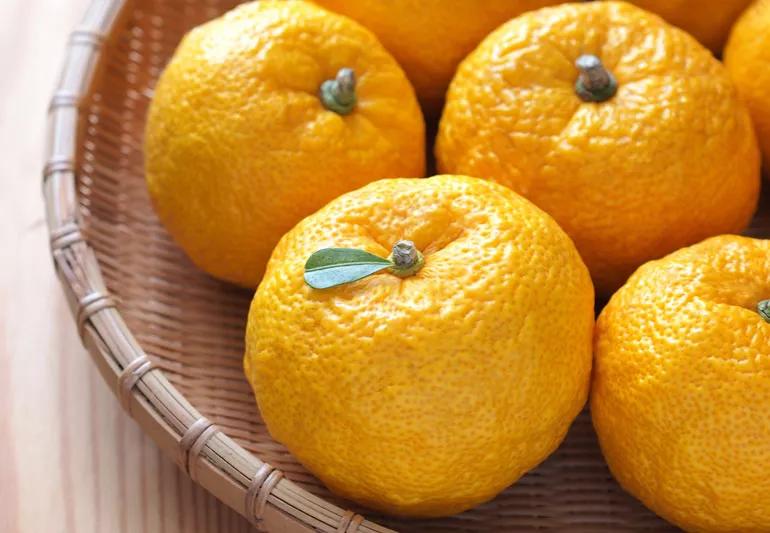The hard-to-find citrus is trendy in the culinary world and good for you, too

Image content: This image is available to view online.
View image online (https://assets.clevelandclinic.org/transform/495e2762-2ea1-4c86-a8d4-fa8454dbdfb0/yuzu-Fruit-635772156-770x533-1_jpg)
Closeup of yellow yuzu fruit in a wicker basket.
A hard-to-find fruit known as yuzu is a trendy choice for zesting up dishes and drinks. But here’s the question: Does the nutritional value of this aromatic and flavorful citrus match its growing culinary buzz?
Advertisement
Cleveland Clinic is a non-profit academic medical center. Advertising on our site helps support our mission. We do not endorse non-Cleveland Clinic products or services. Policy
Let’s find out from registered dietitian Beth Czerwony, RD, LD.
The story of yuzu starts in Asia, either in China or Korea. There’s scholarly debate as to where the hybrid fruit originated. (Given that it happened more than 1,000 years ago, it’s doubtful that argument will be settled.)
The lemon-like fruit eventually found its way to Japan, where it became a favored ingredient in the nation’s cuisine.
Yuzu is renowned for its tart taste, which carries hints of lemon, grapefruit and orange. It also is extremely aromatic, with a floral citrus fragrance that borders on legendary. (More on that in a bit.)
The tree-born fruit continues to be grown in Asia, as well as Australia and several European nations (France, Italy and Spain). A limited amount of the fruit is grown in the United States, primarily in California.
So, why is fresh yuzu not seen in the produce bins at your local grocery store if you live in the U.S.? Well, the Department of Agriculture bans imports of the fruit of yuzu trees given concerns about potential plant diseases
“It’s very hard to get,” says Czerwony. “And if you do find it at a specialty market or order it online, expect it to be pretty expensive.” (Costs often start around $15 a pound for yuzu.)
Advertisement
So, what kind of nutritional goodness is packed into a yuzu? As you might expect from a citrus fruit, it’s loaded with vitamin C. “That’s the big claim to fame with any citrus fruit,” notes Czerwony.
Yuzu also contains health-promoting bioactive compounds such as flavonoids, carotenoids and tannins. And it’s filled with nutrients like:
Adding yuzu to your diet may help you:
Studies show that yuzu can help suppress inflammation in your body, which may make the fruit a natural remedy to relieve or minimize conditions such as asthma or inflammatory bowel disease.
Yuzu is chock full of antioxidants that can protect cells in your body from diseases such as cancer, says Czerwony. Much of the focus centers on the anti-cancer properties of limonoids, which are found in yuzu and other citrus fruits.
Extract from yuzu appears to protect against the formation of excessive blood clots, which may make it beneficial for people with an elevated risk of heart disease or stroke. Basically, the fruit acts as a blood thinner.
The vitamin C in yuzu also can reduce stress on your heart and keep your ticker ticking.
A bit of yuzu in your diet could help you stay mentally sharp. Studies show that the fruit may guard against dementia while improving memory and overall cognitive function.
The fragrance of yuzu isn’t just pleasant for your nose. The scent of yuzu has been shown to decrease stress, tension and anger after just 10 minutes, which can help your body relax and run more efficiently.
So, is there a big nutritional difference between yuzu and lemons, citrus cousins that are the same bright yellow color and similarly sized? Not really, states Czerwony.
“The nutritional resume of yuzu is pretty comparable to any other citrus, including lemons and grapefruit,” she continues. “You’re getting similar benefits from all of them. Yuzu is not a superior fruit by any means.”
Yuzu and lemon are used similarly in cooking, too. Their juice and zest serve more as an accent or flavor enhancer for dishes or drinks — including coffee. (Yuzu espresso tonics are a thing, and lemon coffee trended as a weight-loss solution for a hot minute.)
If you’re culinary curious and want to see what all the fuss is about, there’s no harm in tracking down a yuzu fruit. It does offer a unique taste that has been featured by some of the world’s top chefs.
But don’t go on a yuzu scavenger hunt thinking you’re getting a health food juggernaut.
“Yuzu is trendy, but it’s not nutritionally special,” says Czerwony. “Don’t go out of your way to find one thinking that it’s the key to better health. You can get the same benefits out of other citrus.”
Advertisement

Sign up for our Health Essentials emails for expert guidance on nutrition, fitness, sleep, skin care and more.
Learn more about our editorial process.
Advertisement
Pick bell peppers to help fight cancer, memory decline and joint pain
The tropical fruit is a good source of antioxidants and vitamin C
High amounts of cholesterol and saturated fat in red meat may be linked to heart disease
The leaves and pods from this tree are rich in essential nutrients
This starchy root vegetable is a staple in many global cuisines — but it has to be prepared correctly, or it can cause serious concerns
These delicate green sprouts can give you an extra dose of vitamin K and other nutrients — but they’re not safe for everyone
Edamame, lentils and chicken breast are good sources of protein
Eating this root vegetable can help support your eye, heart and brain health
Prioritize your health by managing stress, strengthening your social connections and getting quality sleep
Bolsters, blankets, pillows and blocks can offer extra support, stability and comfort
Allergies, postnasal drip, asthma or reflux could be to blame for a cough that won’t quit